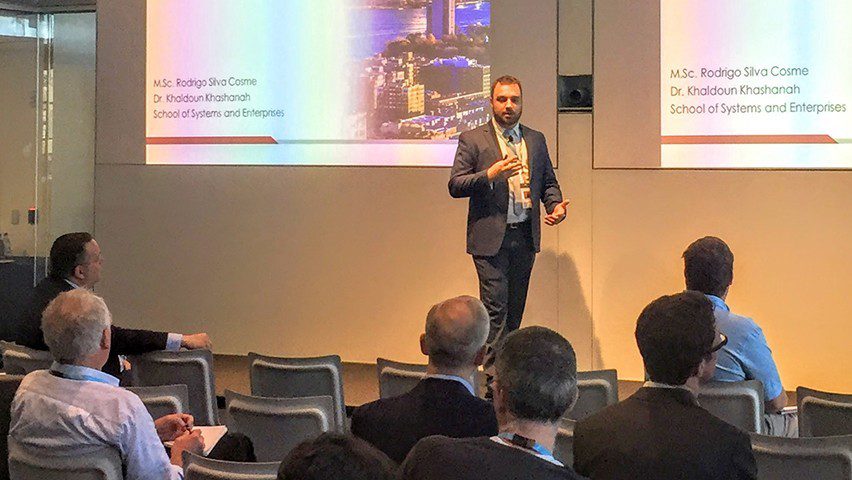Our 5 Favorite MBA Podcasts Right Now

Clear Admit recently looked into some of the best business school podcasts out today. Take a look at a few of the premiere productions below.
Many business schools and MBA students have recently begun to produce podcasts, discussing the diverse range of student and graduate experiences as well as current trends and relevant topics in business. These podcasts are unique in that they provide a candid, first-person look at business school from those currently enrolled, allowing for an open platform to discuss business topics outside of the confines of the university. While this is a fairly new trend, there are several different podcasts out there for those who might be interested to learn more. We’ve assembled our five favorite MBA podcasts right now, and we’ll keep an eye out for new podcasts to highlight going forward.
Business Beyond Usual, by Ross Business School Students
One very cool MBA podcast on our radar is Business Beyond Usual, produced by students at the University of Michigan’s Ross School of Business. The podcast tackles a variety of issues of interest to both prospective and current business school students. Recent episodes have delved into topics including:
- Is business education a waste of money?
- Do school rankings actually mean anything?
- If you want to make a difference in the world, is working for a consulting firm selling out?
The podcast describes itself as having no rules or moderators, so those looking for an unfiltered opinion on the MBA experience may be interested in what these Michigan students are doing. With more than 20 episodes in the series already, there’s a wealth of material already for this relatively new podcast. Business Beyond Usual is available on iTunes, Stitcher, and Soundcloud.
Why CBS Podcast
Those looking for an Ivy League perspective may be interested in the Why CBS Podcast, a series for Columbia Business School hosted by Fahad Ahmed, a 2017 graduate of the program. Why CBS features interviews with students, faculty, and alumni who speak candidly about their MBA experience at Columbia, as well as the time leading up to the program and their lives and careers after graduation. Why CBS is currently available on the iTunes Store.
Wharton FinTech Podcast
MBA students at the University of Pennsylvania’s Wharton School have been producing their own podcast, FinTech, since 2015, one of the earliest examples of this fairly recent trend. Boasting a back catalog of almost 50 episodes, this prolific podcast focuses specifically on global financial services, featuring diverse perspectives from CEOs, investors, students, and researchers. This “informative and high caliber” podcast is well-liked by its listeners, offering “a great source of insight into the minds of the founders, investors, and leaders in financial technology,” according to one user review.
Berkeley-Haas Podcasts
While they do not produce a serial podcast like many others, UC Berkeley’s Haas School offers a variety of podcasts and webinars on its website, including several produced by the admissions staff that provide a wealth of information for prospective applicants. There’s a series on financing your MBA, another series of webinars featuring current students discussing the school’s various areas of emphasis, and a third three-part series by Stephanie Fujii, the former executive director of the full-time MBA program, focusing specifically on what the school looks for in its applicants and how best to prepare for your application process.
There’s also a Humans of Haas Podcast produced by students in the full-time MBA program, though most seem to have graduated last year and it’s unclear whether anyone has taken up the reins to continue the podcast going forward. But there are four episodes available on Soundcloud that are worth checking out if you want to get a feel for the school’s students and culture. Each episode focuses on a specific theme and their titles include “Love at Haas,” “Vets at Haas,” “The Politics of Hair,” and “But Where Are You Really From?”
University of Chicago Booth School of Business Podcast
Also of note is the Chicago Booth Podcast Series. This production interviews a variety of CEOs, faculty, and other experienced professionals on a wide array of topics related to current and historical trends in business and finance. Selected archived episodes are available to stream for free on the school website and include diverse topics such as gender and the pay gap, interviews with important historical figures in business, and research on fiscal and monetary legal policy.
These are just a few examples of the many podcasts out there being produced by students and graduates as well as more officially by the schools themselves. These types of podcasts offer a fresh alternative to the often noisy, polluted world of online business commentary and there’s likely a podcast out there devoted to almost any topic that a prospective or current MBA might be interested in learning about.
Boston News: Northeastern Explores Trump Tweets, MIT Offers FinTech Advice and More

Let’s explore some of the most interesting stories that have emerged from Boston metro business schools this week.
Can A Trump Tweet Dramatically Sway A Company’s Value? – Northeastern’s D’Amore-McKim Blog
Will Clark, DMSB ’17, along with Northeastern University D’Amore-McKim School of Business finance professors David Myers and Jeffery Born, sought to understand the impact that President Trump’s tweets—which often directly address publicly traded companies like Ford, Toyota, Walmart, GM, and Boeing—had on their stock market value.
“Past presidents communicated through the media. This was the first time that a president was communicating directly with the public—with investors—about companies. We really weren’t sure what to expect from the data,” says Clark, who is now a credit analyst with Morgan Stanley.
The trio’s research found that Trump’s tweets, in fact, did have some impact on companies, often increasing trade volume within the first few hours and days after he references them on the social media platform. The research was revealed in the academic journal Algorithmic Finance.
“The team found that Trump’s tweets dramatically increased trading volume for the companies’ stocks in the first few days following a tweet. They also found that positive (or negative) tweets about companies increased (or decreased) the firms’ stock prices by a modest amount—just 1 percent. But the changes were only temporary: Within a few days, the firms’ trading volumes and stock prices returned to pre-tweet levels.”
The lasting effect, however, was found to be longing. The trio notes that the most active traders, which they refer to as “noise traders,” were very reactive to Trump’s words, with trading tapering off after only a few days.

“They’re regular people and under-informed investors who want to get in and out and make a buck without thinking too long and hard about it,” Born notes about the financial impact of Trump tweets.
You can read more about the financial research on the Trump tweets from D’Amore-McKim here.
3 Lessons To Keep In Mind When Starting A FinTech Venture – MIT Sloan Newsroom
MIT Sloan School of Management MBA alum Sophia Lin, ’12, and her partner Andrew Kelley of the FinTech startup Keel, which connects “rookie investors with more seasoned ones,” shares some hard-won lessons in an op-ed for the Sloan blog. First of all: beware of hidden costs specific to FinTech. “
“Starting costs are higher than other industries because of data, infrastructure, and security requirements,” Lin said. “Data is expensive, which stops a lot of early stage startups from entering this field. But you need data to build your product.”
Read all of Lin’s words of wisdom here.
More CEOs Have Begun To Take Social Responsibility Seriously – HBR
CEOs from Facebook’s Mark Zuckerberg to Blackrock’s Larry Fink have begun to take very public stands to address the long-term impacts their products have had and continue to have on communities and the environment.
“We are witnessing a big, transitional moment—akin to the transition from analog to digital, or the realization that globalization is a really big deal. Companies are beginning to realize that paying attention to the longer term, to the perceptions of their company, and to the social consequences of their products is good business.”
Harvard Business School John and Natty McArthur University Professor Rebecca M. Henderson also explains that there are distinct differences between the size of a company, which often contrasts with the social goals of the company. The larger the company, the more long-term the outlook, she explains. Unlike small companies, larger firms worry about quarter-to-quarter results less.
“Big firms can also internalize certain externalities. An externality is a cost from a transaction that doesn’t fall on the buyer or the seller. If I pollute the air to make a product I sell to you, the cost of that pollution is spread out across society, and isn’t incorporated in the price I charge you for the product. Externalities pose problems for markets, since neither buyer nor seller have any incentive to deal with the costs. But sometimes, for really large firms, things work differently.”
The unfortunate causality, she notes, is that we are often reliant on the largest companies to take the initiative for causes that may be considered part of the global good. If some companies among the Fortune 500 elect to, say, go carbon neutral within the next decade, that can have a profound impact on other competing companies. And if those initiatives are not as profitable, there is an even greater risk of other companies being reluctant to attempt similar efforts.
Read more about the growing CSR trend among CEOs here.
School v. School: NYU Stern or Columbia Business School?

What happens when you pit two of the New York metro’s top business school’s against each other in a head-to-head duel of MBA might? It’s a school vs. school showdown, as we compare Columbia Business School to the Stern School of Business. Let’s take a deeper dive! Continue reading…
Stevens Alum Takes Disruptive FinTech Lessons Back Home to Brazil

ZeroBeta founder Rodrigo Silva Cosme, a MS ’16 Stevens Institute of Technology’s School of Business graduate, recently returned to his alma mater to present his master’s thesis, explaining how machine learning can apply to financial markets.
Cosme, who was invited by Professor Khaldoun Khashanah, explains; “The world is getting more automated, more efficient, more intelligent, and finance is no different. You need complete professionals who know how to code and also can handle the financial side of the business and implement solutions.” Cosme, who arrived in the United States with a “lifetime fascination with financial markets,” believes people who choose to trade by themselves can’t do it optimally.

Rodrigo Silva Cosme delivers his thesis at a recent Bloomberg conference at Stevens/Photo via Stevens.
The São Paulo-based ZeroBeta is a unicorn of sorts in the Brazilian market, which “lacks the liquidity that allows for more diversified risk in investment strategies.” The startup leverages algorithmic trading and portfolio optimization techniques to “build smarter strategies for trading.
Cosme continues, saying, “Instead of working for [hedge fund managers], we trade with them—we develop the strategies for the accounts, we make the trading decisions, and they do the commercial side of the business, getting customers and raising capital.”
Cosme attributes ZeroBeta’s success largely to the first-hand exposure he received at Stevens to the myriad ways that finance and technology can intersect. “What I do at my job, every day, is what I learned at Stevens — from trading option spreads, to coding through C++ design patterns, to portfolio rebalancing. If you’re not able to find the answers with the kind of resources Stevens has, you can’t find them anywhere.”
Why Bloomberg Businessweek Is Praising the UGA Terry College of Business

At the top of last month’s annual Bloomberg Businesweek domestic MBA rankings, the normative favorites reigned supreme, with the likes of the Harvard Business School, the Wharton School at the University of Pennsylvania, and the MIT Sloan School of Management sitting at the top of the ranking. A quick glance at the top 20 features more of the same, with Ivy League institutions coming in strong, as well as other large school powerhouses like the UCLA Anderson School of Management.
But the real meat and potatoes of the list, beyond stacking trophy cases for the already trophy-rich schools at the top, are the schools that shoot up the rankings the most, sometimes jumping eight or more spots from the previous year. Among the most lauded institutions that made its way up the rankings is the University of Georgia Terry College of Business, climbing from 65th overall in 2016 to 55th overall this year.
Santanu Chatterjee—the full-time MBA Director and Associate Professor of Economics at the Terry College of Business—recently spoke with MetroMBA, saying that part of the reason the school has earned such high praise is because of the concentrated effort of life after graduation.
The school has “a purposeful and deliberate strategy that connects admissions, student experience, and career management, by focusing on employability at the front end, a high level of customized career services for both students and employers, and a market-driven curriculum that ensures professional success for our students,” according to Chatterjee, who originally joined the Terry College of Business in 2001, just after earning his Ph.D. in economics from the University of Washington.

Santanu Chatterjee, Terry College of Business Director, Full-Time MBA Program and Associate Professor.
Although the Terry College of Business is part of the University of Georgia, one of the largest state schools in the U.S., its reputation still lags a bit behind some of the other big name brand institutions. As evident in its climb in the Bloomberg Businessweek ranking, however, its reputation as one of the better, under-the-radar business schools may be soon changing as the result of a plan that has been years in the making.
“Over the past three years, we have focused on making our curriculum more sensitive to the needs of the marketplace,” he says. “Initiatives have included new concentrations in Healthcare Management and Human Resource Management, areas of emphasis in Consulting and Financial Technology (FinTech), and an expanded focus on experiential/project-based learning. Most of our students complete one project with a corporate partner before their summer internships. We have also revamped our Leadership Fellows Program, and set up two new advisory boards, in Atlanta and in the Silicon Valley.”
Part of the wave of program changes over the past few years also comes from newfound partnerships with many of the University of Georgia’s other esteemed colleges, establishing newfound dual degree programs to help facilitate an academic edge many of the country’s smaller schools simply cannot provide.
“While we continue to work on making the MBA curriculum more market-driven, we are also focused on a more interdisciplinary approach to business education,” he says. “Over the past three years, we have worked to develop new dual degree programs with the College of Engineering, Law School, Medical School, and the College of Public Health. New dual programs are currently being developed that include the College of Pharmacy and a one-year STEM MBA for UGA undergraduates in the STEM disciplines. A new one-year Master of Science program in Business Analytics is also awaiting final approval from the University System. These new programs will enable us to significantly expand our corporate relationships and partners, which in turn will help support our curriculum and student support initiatives.”
The use of broader university resources speaks to what Chatterjee believes is becoming a definitive advantage to not only Terry College of Business students, but University of Georgia students as a whole.
“Across the board, the Terry College of Business is focused on student success by providing them with an outstanding academic and experiential learning experience,” he notes. “This philosophy cuts across programs at all levels, from undergraduate to the Masters and Ph.D. [programs]. We have a roster of world-class faculty, excellent facilities, and a dedicated network of more than 70,000 alumni who work tirelessly to improve the quality of education and career success for our students.”
Even with the noted praise Chatterjee eschews for the business school, one program strength he may be overlooking is the welcomed affordability of the Terry full-time MBA, which only costs Georgia-based residents $15,670 per year, compared to several of the more popular MBA programs in the U.S., which often venture into triple digit territory by the end of the program.
For more information on the Terry College of Business and its increasingly praised MBA program, head over to the official Terry College of Business website.
NYU Stern Receives $8 Million Alumni Gift to Promote Technology, Business, and Innovation

This week, NYU Stern School of Business announced the development of a new center to serve as a hub for cross-disciplinary collaboration and technology innovation. The new Fubon Center for Technology, Business, and Innovation was made possible thanks to an $8 million donation from alumnus Richard Ming-Hsing Tsai (MBA ’81). Tsai is chairman and CEO of Fubon Financial Holding Co., Ltd. and Fubon Life Insurance Co., Ltd. He is also vice chairman of Taiwan Mobile Co., Ltd.
The Fubon Center will support and facilitate collaboration in areas such as fintech, business analytics, technology, and entrepreneurship. It will also serve as a new nexus for continuous innovation at NYU Stern by strengthening industry ties and promoting cutting-edge research. Additionally, the Fubon Center will help to shape future coursework and encourage academic collaboration between NYU Stern and National Taiwan University, Tsai’s undergraduate alma mater.
“Technology demands that companies, regardless of industry, be nimble, adapt, and innovate at an unprecedented rate,” Stern Dean Peter Henry said in a press release.”Thanks to the generosity and inspiration of our alumnus Richard Tsai, we can help transform these challenges into exciting opportunities, staying as relevant to the new economy as we are to Wall Street.”
The new Fubon Center isn’t the only initiative that has been established over the last 18 months at Stern. In 2014, the school delivered one of the first courses on blockchain, which eventually led to the creation of the MBA FinTech specialization in 2016. Then, this past May, Stern launched a new Tech MBA, a one-year specialized MBA program focused on business and technology. It offers experiential learning projects with companies through Stern Solutions Programming. These initiatives and others are all part of Stern’s latest mission to expand its offerings at the intersection of business and technology.
To learn more about what NYU Stern is doing in the technology and business space, visit the school website.
ICYMI–Stern’s advances in technology education and career placement were also featured in this recent Clear Admit story: “More Top Business Schools Training MBA Students for Careers in Tech.”
This article has been edited, updated, and republished on our sister site, Clear Admit.
